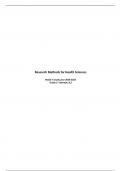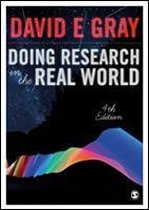Research Methods for Health Sciences
Made in study year 2024-2025
Grade 1st attempt: 8,5
,Lecture 1 ‘Research perspectives, research objective, and research questions’
What makes an issue a complex issue?
- Globalisation (e.g., policies in other countries make problems from here more
complex).
- Boundaries of different social groups can make problems (because these are not
rigid but rather fuzzy).
- Working with people (e.g., people have internalized rules that may differ).
- Agents within the system change.
When the issue gets more complex, you need a bigger range of research methods (e.g.,
methodologies or theoretical perspectives or epistemology).
These four are always present in a research project and they are closely related.
Often within this figure there is a certain flow; some aspects of epistemology will lead to
aspects in the rest (somewhat ‘normal flow according to which point’).
,This lecture will focus on epistemology and theoretical perspectives.
Epistemology
The study of knowledge; the study of what constitutes valid knowledge.
Your knowledge develops over life and looks for ‘how do we know that things are true?’.
Knowledge will help you justify the choices that you make when you make a research
design. Additionally, it can clarify issues of research designs in interdisciplinary teams or
complex problems.
Three types of epistemologies:
1. Objectivism
There is an objective reality ‘out there’.
You believe that there is an external world, and we can discover this external world
(with its objective reality). In objectivism, research is about discovering this objective
truth.
Connects to positivism (there is one truth that we should discover), however, at
some point this was argued against (there is not one truth).
Objectivism tries to approximate the truth: we try to come as close as possible to the
truth, but we realize that the full truth is not possible (therefore, sometimes seen as
post-positivism).
Many study designs connect to this, e.g., RCT.
2. Constructivism
Subjects construct their own meaning in different ways.
Argues that there is not an external world, but knowledge is in connection between
persons and the world around them (meaning is constructed, not discovered).
Multiple people will construct knowledge (on the same thing) differently, each of
these is valid.
This is connected to the theoretical perspective of ‘interpretivism’: multiple
contradictories but equally valid accounts of the world can exist.
3. Subjectivism
Meaning is imposed by the subject on the object.
Imposes the idea of interaction; individuals are imposing meaning on a subject.
Subjects do construct meaning, but do so from within collective unconsciousness,
from cultural and religious beliefs, etc. (emphasises multiplicity).
It is a theoretical perspective linked to subjectivism.
It is important to understand that different epistemologies link to theoretical perspectives
and methodologies.
According to your epistemology, you will have a different theoretical perspective,
methodology, and method. Some links are not possible between these.
Epistemology depends on the AIM of the study.
Methodology depends on research question (explaining, understanding, exploring,
describing).
, Theoretical perspectives
Critical inquiry
This critical form of research is a meta-process of investigation. The critical inquire
perspective is not content to interpret the world but also seeks to change it.
- Not only trying to understand the world, but also trying to change.
Feminism
Feminist epistemologies take the view that what a person knows is largely determined by
their social position.
These are connected in the following way:
Epistemic injustice
When certain groups of people are told that their understanding of reality/knowledge is not
correct (on a systemic level: not individuals but groups of people).
These groups are then often undervalued/excluded/silenced.
E.g., children with a certain conditions/persons with disabilities are not asked themselves on
how they feel, but rather their health care workers/teachers etc. Then their own knowledge
is not taken for real.
E.g., in the field of global health, there is still the tendency to disregard local (and indigenous
knowledge), which refuses to learn from people often deemed to be the lesser.
Objectives and research questions
For obtaining research questions/objectives, you can use literature research or for instance
information from other problems you have researched earlier. Additionally, research
agenda’s give hot topics.
External research objectives
Contribution of your research project to solution of the problem.
E.g., making the costs of this kind of research less expensive.
Internal objective
The way in which this will be done/ the insights, information, knowledge – very similar to
research question.
e.g., see slide 41
You can get a research objective from your research topic and research questions from your
research objective.





